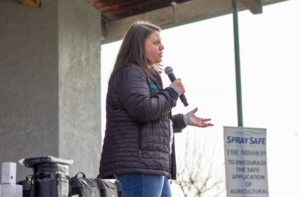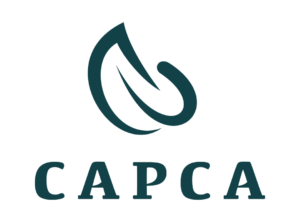Growing Together Spring 2024
Preparing Tomorrow’s PCAs Today
The pest control adviser (PCA) plays an integral role in every crop operation in northern California. That role is anything but static; while there are fundamental building blocks for what makes a good PCA, the what, why and how of the job change often — sometimes multiple times during a single growing season. Along with experience and expertise, that puts flexibility high on the list of key attributes that enable today’s PCAs to alleviate the many pressures their growers face in every crop.

Those attributes are just part of the equation. Equipping current and future PCAs with the tools they need to maintain and evolve the level of service to growers implicit to the PCA role is the heart of Ruthann Anderson’s job. The California Association of Pest Control Advisers (CAPCA) CEO knows the toolbox necessary for every PCA to work effectively is ever-changing. It requires a close, almost predictive eye on what growers need and how PCAs can continue to meet those needs, all while staying ahead of evolving regulatory requirements while growing the output of crops vital to the food supply.
That’s a lot. The number of balls to juggle at once has never been higher for PCAs, Anderson, the CAPCA team and industry teammates like Grow West. That’s why the statewide association is eager to work with partners like Grow West Chief Operating Officer and Vice President Lucas Schmidt.
“A lot of our work is standing back and taking a moment to ask what the PCA role will look like in 10, 20 and 50 years. Then, we think about the tools and functionality we need the PCA license to provide so we maintain the highest level of professionalism among licensed PCAs,” said Anderson, who’s served numerous roles at CAPCA, the association representing the state’s PCAs and the PCA license in general. “That’s why CAPCA works so closely with Grow West; they’re a great resource for us in helping prepare current and future PCAs to continue to be qualified and maintain their trusted adviser roles in this evolving space.”
Looking back and looking forward
The effort to evolve the PCA’s role is more than just looking ahead. It starts with a clear assessment of skillsets of today’s PCAs that often differ from their predecessors. It’s also a profession in which institutional knowledge is massively important. Decades and generations of experience and accumulated expertise comprise the foundation of every PCA’s effectiveness in his or her job. With a major generational shift underway, recognizing how new PCAs work differently from their predecessors and preparing to meet future demands of the job are both important today, with so many intergenerational transitions underway.
“There’s a stereotype that PCAs are part of our industry that just make program recommendations and walk away. But in reality, PCAs make very prescriptive recommendations based on what they see in the field and what crops need. That is the power of the PCA: the ability to apply expertise and experience in almost surgically precise recommendations,” Schmidt said. “The business has changed, and while agronomy is still key, becoming a successful PCA requires budgetary acumen and the knowledge of how to do things economically based on intimate knowledge of a grower’s operation and business.”
CAPCA’s role in its 50th year
In its 50th year, CAPCA has a specific role in nurturing that change and maintaining the foundation of professionalism for the state’s PCA licenses. Ensuring PCAs remain relevant to their customers is a matter of connecting the role to both the grower level and federal/state regulatory environment. With so many daily duties, it’s difficult for PCAs to get involved in policymaking in Sacramento or Washington, D.C. That’s where CAPCA steps in, ensuring they have a representative in regulatory discussions that shape their license. 
“They don’t have the luxury of time to leave the field because they’re out working with growers. We recognize the historical role of CAPCA being created 50 years ago to represent PCAs in policy discussions,” Anderson said. “We are able to tell the story of PCAs and how they continue to make informed recommendations and navigate the complexities of agriculture while overcoming the public perception that PCAs and growers are doing whatever they want. It’s all about raising awareness of what they do, how they do it and why it matters.”
Equipping PCAs for key agronomic decision-making
While maintaining awareness of the PCA’s key role in sustaining and growing agriculture’s productivity and environmental stewardship on the policymaking side, CAPCA’s work is equally vital in preparing PCAs for the jobs that are massively important to the state’s largest economic driver. Though it’s geared toward a single mission — cementing PCAs’ roles as the trusted advisers on whom so many California growers depend — preparing current and future PCAs for their jobs is a multifaceted endeavor.

“Pulling together all the complexities — from following changing pesticide regulations to thinking holistically about how to best work with growers — has enabled us to connect the PCA license to all of the core things we believe are important today and will be tomorrow,” Anderson said. “Then, we apply those things and how they’ll evolve to the PCA license so growers know they will always have a trusted adviser who can make decisions to support successful agronomic performance and harvest. Growers are always involved, but we want to ensure they know their PCAs can always help make important, balanced decisions that enable them to do what they do best.”
Building the diverse, evolving PCA skillset
That’s as complex a task as it’s ever been. Changing product availability and efficacy calls for an unprecedented level of focus on every acre, as well as the tools and technology growers can use to optimize every agronomic scenario. The PCAs of today and tomorrow will be pushed to maintain diverse technical expertise for a higher number of products and technologies, and more importantly, how they’re optimally applied in each field, orchard or vineyard.
“I think that PCAs should already have technical expertise, but I think it’s going to be stretched even further in being able to really read findings and ascertain the viability of a product or technology. With the trend of softer chemistries, beneficials and biologicals, there isn’t a broad application silver bullet so there will be even more emphasis on PCAs understanding the ground you walk, the microclimates you’re in and being able to translate opportunities to best serve each specific plot of land,” Anderson said. “I really envision things becoming more hyperlocal. With that hyper-specific focus, I expect the PCA’s relationship with the grower and the time invested with that grower and operation will increase. I think that the work of the PCA has to be more integrated across the whole farm in the future to maintain production under growing and changing regulations.”
How Grow West prepares new PCAs
Putting these changing skills into action is something Schmidt knows will continue to be part of his job and others at Grow West. That’s why he and other Grow West leaders are leveraging their close relationship with CAPCA in leading the effort to integrate new PCAs in a deliberate strategy that both builds upon institutional knowledge and develops relevant new skills.
“Being a good listener and having a strong work ethic and the willingness to learn are all so important. Communication and relationship management are huge parts of the PCA’s job, and that’s changing rapidly. Depending on the customer, a PCA may be communicating face-to-face, by phone, or via text or email,” Schmidt said. “Having a strong transition period is essential as long-standing PCAs retire. Transitioning in new PCAs in a deliberate process helps ensure they develop the right skills while gaining the institutional knowledge of their predecessors so they can best help growers manage all the pressures they face.”

